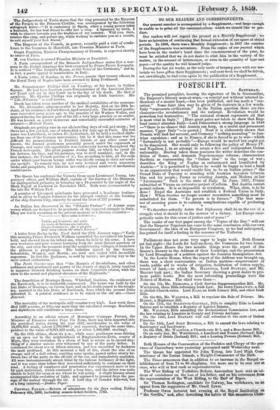POSTSCRIPT.
SATURDAY.
The promised pamphlet, bearing the signature of De la Guerroniere, the Emperor's literary man-at-arms,—a rescript not without internal in- dications of a master hand,—has been published, and has made a "sen- sation." Some faint idea may be given of its contents in a few words. Italy "represents civilization.' In the Italian question there are two elements—the revolutionary and the national. Revolution would be
powerless but destructive. The national clement represents all that is most vital in Italy." [Here great pains are taken to show that Eng- land cannot abandon Italy—Lord Palmerston's strong language in 1848 —4there is no chance that Austria can keep, in a useful and permanent manner, Upper Italy "—is quoted.] Next it is elaborately shown that Prussia will find her account, and Germany "nothing menacing" in Aus- trian expulsion ; and as to France, if she is forced to go to war—which "fortunately is not probable "—Europe would be moved but ought not to be disquieted. She would only be following the policy of Henry IV. and Napoleon I. in an attempt to create a free and independent Italian nationality. Having taken these positions the writer describes the con- dition of Rome, and demands Napoleonesque reforms; characterizes Sardinia as representing the "Italian idea" to the verge of war describes the King of Naples as embarrassed and humiliated by Austria—" it is permitted to believe he would be happy to lend a hand to an organization that would enable him to be an Italian prince ;" the Grand Duke of Tuscany as standing with Austrian bayonets between him and his people ; Parma as resisting Austria, and Modena as her Lieutenant.' Such is the state of Italy. In June, 1857, France submitted at Vienna an extensive project of reform. But Austria cannot permit reform. It is as impossible as revolution. What, then, is to be done ? Expel the Austrians and establish a Federal Union in Italy. Row? When treaties no longer answer necessities something must be substituted for them. "To govern is to foresee." The best man- ner of securing peace is to outstrip complications capable of producing
war.
" We therefore ardently desire that Diplomacy shall do on the eve of a struggle what it should do on the morrow of a victory. Let Europe ener- getically unite for this cause of justice and of peace !"
The reader of our first paper among the "Topics of the Day" will see that the Emperor Napoleon has come to the same conclusion with our own. Government : the idea of an European* Congress, as we had anticipated, has gained for itself a footing in the recesses of the Tuileries.


































 Previous page
Previous page